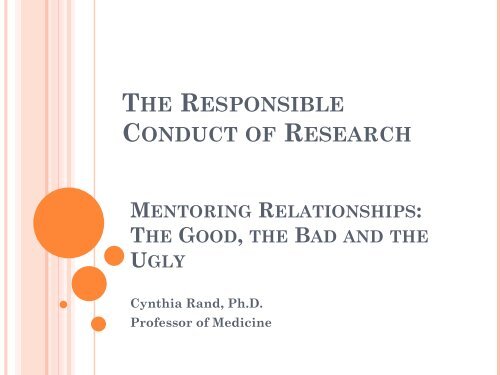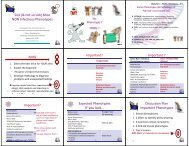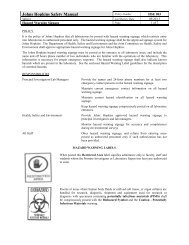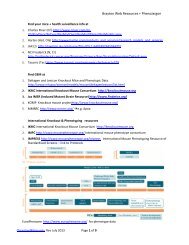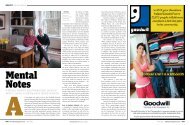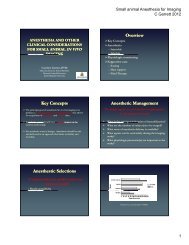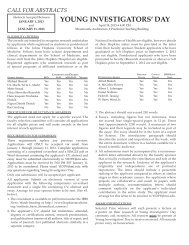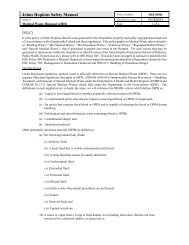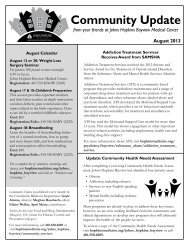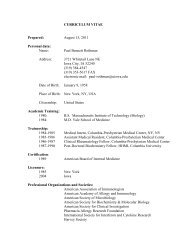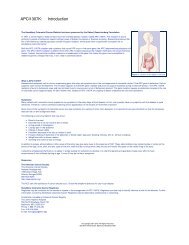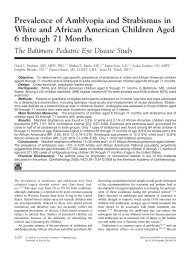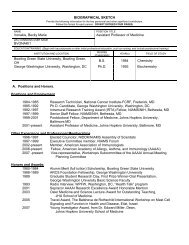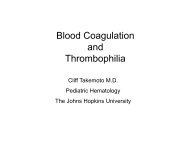Mentoring Ethics: - Johns Hopkins Medical Institutions
Mentoring Ethics: - Johns Hopkins Medical Institutions
Mentoring Ethics: - Johns Hopkins Medical Institutions
Create successful ePaper yourself
Turn your PDF publications into a flip-book with our unique Google optimized e-Paper software.
THE RESPONSIBLE<br />
CONDUCT OF RESEARCH<br />
MENTORING RELATIONSHIPS:<br />
THE GOOD, THE BAD AND THE<br />
UGLY<br />
Cynthia Rand, Ph.D.<br />
Professor of Medicine
DISCLOSURES<br />
Financial: Merck Childhood Asthma Network<br />
(Scientific Advisory Board-Chair); TEVA<br />
(Scientific Advisor); Vertex (Scientific Advisory<br />
Board)<br />
Research: National Institutes of Health (NIH)<br />
Legal Consult/Expert Witness: None<br />
Organizational: None<br />
Gifts: None<br />
Tobacco: None
OVERVIEW<br />
Why care about mentoring<br />
The link between mentoring relationships and<br />
the responsible conduct of research<br />
The hallmarks of good and bad mentoring<br />
relationships<br />
Mentor-Mentee Vignettes: You‟re the Judge<br />
Institutional role in enhancing the quality of<br />
mentoring relationships
WHY CARE ABOUT MENTORING<br />
RELATIONSHIPS?
WHY CARE?<br />
<strong>Mentoring</strong> is the primary process for formal research<br />
training of the next generation of scientists.<br />
• Knowledge- what content domains do you need to<br />
master?<br />
• Skills –what you need to be able to do (techniques,<br />
procedures, methodologies)<br />
• Critical thinking- how do you generate hypotheses?<br />
• Observation- how do you interpret data?<br />
• Communication –how do you present data, write<br />
papers?<br />
• Collaboration- how do you collaborate within and<br />
across teams and networks?<br />
• Rules –what are the rules for the responsible<br />
conduct of research?
WHY CARE?<br />
Mentors also serve as role models and informal<br />
guides to the “society” of science and academic<br />
medicine<br />
• Formal and informal networks and collegiality<br />
• Career guidance and advocacy<br />
• Prioritization and time-management<br />
• Professionalism, values and attitudes<br />
• Passion, curiosity and fun<br />
The nature and quality of mentoring of new<br />
academic medical researchers will determine the<br />
future culture and success of science for years to<br />
come
But why care about mentoring relationships and the<br />
responsible conduct of research?
How Many Scientists Fabricate and Falsify Research?<br />
2% of scientists<br />
admitted to have<br />
fabricated, falsified or<br />
modified data or results<br />
at least once<br />
From G. Dover with permission, Fanelli D (2009) How Many Scientists Fabricate and Falsify Research?<br />
A Systematic Review and Meta-Analysis of Survey Data. PLoS ONE 4(5): e5738.
MENTORING AND RESEARCH MISCONDUCT:<br />
WRIGHT ORI REVIEW OF TRAINEE MISCONDUCT<br />
Closed ORI cases of trainee misconduct 1990-2004<br />
33 post docs, 10 graduate students and 2 additional<br />
trainees<br />
All but three cases involved either or both<br />
fabrication and falsification<br />
77% admitted to misconduct<br />
• most signed a Voluntary Exclusion Agreement with ORI<br />
precluding them from receiving federal funds for<br />
research from 3-5 years<br />
• 63% required retractions of publications<br />
• 41% fired or dismissed, 43% resigned<br />
By permission from T. Cheng. Wright DE et al. Sci Eng <strong>Ethics</strong> 2008<br />
14:323-336
MENTORING AND RESEARCH MISCONDUCT: RESULTS<br />
In review of 33 cases in which trainees were found<br />
guilty of scientific misconduct:<br />
• 90% involved fabrication, falsification or both<br />
• Over half first reported by someone other than<br />
mentor<br />
• 63% led to retractions of published papers<br />
• 73% mentors did not look at raw data<br />
• 62% mentors did not have set standards for<br />
recording data<br />
From G. Dover by permission Wright DE et al. Sci Eng <strong>Ethics</strong> 2008 14:323-336
MENTORING AND RESEARCH MISCONDUCT<br />
53% of cases described their stress levels as a<br />
factor that caused or contributed to their<br />
misconduct<br />
• 62% felt pressure to perform well<br />
• 38% felt time-related stress such as submitting a<br />
grant, publication or publication deadline or complete<br />
dissertation<br />
• 17% felt unreasonable pressure from the mentor to<br />
get desired or quick results<br />
By permission from T. Cheng. Wright DE et al. Sci Eng <strong>Ethics</strong> 2008 14:323-336
“Even though I had already secured a position…and<br />
had 18 publications, an NIH fellowship and several<br />
awards for my prior work, I believed myself to be a<br />
complete failure as a scientist…I think that was going<br />
through my mind, and led me to believe that, if I could<br />
just show one piece of „promising‟ data at a group<br />
meeting, my supervisor would let me continue working<br />
on the problem and produce real data that could be<br />
presented and published…”<br />
By permission from T. Cheng. Wright DE et al. Sci Eng <strong>Ethics</strong> 2008 14:323-336
DID INADEQUATE MENTORING CONTRIBUTE<br />
TO/FAIL TO PREVENT MISCONDUCT?
WHAT WOULD CONSTITUTE<br />
INADEQUATE MENTORING?<br />
Failure to review trainee raw data at regular intervals<br />
Failure to establish clear standards for:<br />
• Keeping lab books<br />
• Managing and retaining data<br />
• Authorship<br />
Failure to adequately support trainee career<br />
development<br />
• Unsupportive work environment for trainees<br />
• Undue pressure to produce results quickly<br />
• Unreasonable expectations as to productivity<br />
• Failure to monitor and be alert to stress levels of trainees<br />
Adapted from J. Freischlag with permission
SO WHAT IS GOOD MENTORING?
CHARACTERISTICS OF SUCCESSFUL<br />
MENTORING RELATIONSHIPS<br />
Reciprocity: bidirectional<br />
nature of mentoring,<br />
including consideration of<br />
strategies to make the<br />
relationship sustainable<br />
and mutually rewarding<br />
Mutual respect: respect<br />
for the mentor and<br />
mentee‟s time, effort, and<br />
qualifications<br />
Shared values: around<br />
the mentor and mentee‟s<br />
approach to research,<br />
clinical work, and personal<br />
life<br />
Clear expectations:<br />
expectations of the<br />
relationship are outlined<br />
at the onset and revisited<br />
over time; both mentor and<br />
mentee are held<br />
accountable to these<br />
expectations<br />
Personal connection:<br />
connection between the<br />
mentor and mentee<br />
Strauss et al . Acad Med. 2013;88:82–89.
WHEN MENTORING FAILS<br />
Poor communication:<br />
including lack of open<br />
communication, failure<br />
to communicate<br />
tactfully, and inability<br />
to listen<br />
Lack of commitment:<br />
lack of time committed<br />
to the relationship or<br />
waning interest over<br />
time<br />
Perceived (or real)<br />
competition<br />
Personality differences:<br />
different personal<br />
characteristics between<br />
the mentor and mentee<br />
Conflicts of interest:<br />
competing agendas<br />
between the mentor and<br />
mentee<br />
Lack of experience:<br />
mentor may not have<br />
relevant knowledge, skills,<br />
or experience<br />
Strauss et al . Acad Med. 2013;88:82–89.
VIGNETTE 1<br />
Mei is a Ph.D international postdoctoral fellow<br />
hired to work on Dr. X‟s exciting new proteomics<br />
grant. Mei‟s spoken English skills are poor,<br />
however, other fellows and technicians in the lab<br />
speak Chinese so she has had no problems working<br />
in her lab setting. She has worked long hours and<br />
her research has yielded a number of important<br />
new findings , however, Dr. X has refused to allow<br />
Mei to take first authorship on any publications.<br />
Mei is increasingly stressed that her work in Dr.<br />
X‟s lab is not advancing her career, but she is<br />
anxious and uncertain about what she should do.
POTENTIALLY VULNERABLE MENTEES<br />
International scholars may be fully reliant on<br />
their mentor for visa status and/or salary<br />
Limitations in English skills may contribute to<br />
misunderstandings and isolation from the<br />
broader academic community<br />
Cultural differences may exist related to<br />
expectations about mentee/mentor relationships,<br />
lab practices, expectations for performance<br />
<strong>Mentoring</strong> International PostDocs http://ori.hhs.gov/rcr/CHOP_VideoGuide.pdf
VIGNETTE 2<br />
Dr. B. is a Division Director of a busy clinical division in<br />
Medicine. He is under increased pressure to meet clinical<br />
demands of a newly opened service at Greenspring Station.<br />
To meet these needs he recruits Dr.T, straight out of<br />
fellowship at UNC Chapel Hill, to join the faculty. Dr. T is<br />
very excited to come to <strong>Hopkins</strong> because of the opportunity to<br />
develop a clinical researcher career. Dr. B. has assured Dr. T<br />
that <strong>Hopkins</strong> is a wonderful environment for a budding<br />
clinical researcher. In the offer letter Dr. B notes that he will<br />
serve as Dr. T‟s mentor and that they will meet regularly to<br />
review progress toward academic goals. After one year, Dr. T<br />
has found it difficult to get a research program going with his<br />
7 clinics a week and the conversion to EPIC. At the time of<br />
his annual review, Dr. B. says that Dr. T has been a<br />
wonderful addition to the Division, and he would therefore<br />
like him to take on the role of co-director of the fellowship<br />
program. Dr. T is worried that this will further retard his<br />
research career.
CONFLICT OF INTEREST MENTORING?<br />
“a division chief may find conflict of interest in his or<br />
her roles as both guardian of the division and<br />
facilitator of a junior faculty member's professional<br />
aspirations”<br />
Pololi and Knight J Gen Intern Med. 2005 September; 20(9): 866–870.
WHICH HAT?<br />
Manager<br />
Mentor<br />
<br />
<br />
<br />
Directs the work of the<br />
individual<br />
Focused on performance,<br />
professional development and<br />
career development<br />
Based on organizational<br />
needs<br />
Driven by learning agenda<br />
influenced by organizational<br />
needs<br />
<br />
<br />
Inside the hierarchy of direct<br />
reporting relationships<br />
Sometimes, but not always<br />
confidential<br />
Guide and support the<br />
individual<br />
Focused on professional<br />
and personal development<br />
Based on mentee‟s<br />
expressed needs<br />
Driven by specific learning<br />
agenda identified by the<br />
mentee<br />
Outside the hierarchy of<br />
direct reporting<br />
relationships<br />
Confidential<br />
Adapted from M. Feldman, UCSF Faculty <strong>Mentoring</strong> Toolkit<br />
http://academicaffairs.ucsf.edu/ccfl/media/UCSF_Faculty_<strong>Mentoring</strong>_Program_Toolkit.pdf
VIGNETTE 3<br />
Dr. Y is a very prominent and very successful<br />
researcher. He prides himself on his mentoring<br />
skills and his unbroken record of NIH funding.<br />
He therefore attracts many fellows and junior<br />
faculty eager to work with him. Trainees learn<br />
quickly that they will need to impress Dr. Y with<br />
their data if they want to get his time and<br />
attention. For the smartest and most successful<br />
trainees, Dr. Y can open many doors. And Dr. Y<br />
is just as willing to tell the less successful<br />
trainees that they don‟t have what it takes to<br />
succeed. He believes it‟s important to be blunt.<br />
Dr. Y has won several mentoring awards.
“TOR(MENTORS)”<br />
"[a]t the same time we proffer kudos upon<br />
outstanding mentors, it behooves us to call<br />
attention to those who engage in actively<br />
negative mentoring, which for want of a better<br />
term we shall refer to as 'tormenting.' Perhaps an<br />
award should be given to 'Tormentor of the Year”<br />
Silen, "In Search of the Complete Mentor," in Mentations, Volume 5-Fall 1998<br />
http://ccnmtl.columbia.edu/projects/rcr/rcr_mentoring/foundation/#9
Williams et al. Education for Primary Care (2012) 23: 56–8<br />
TOXIC MENTORS<br />
1) “Destroyers or criticizers” – mentors who focus on<br />
inadequacies<br />
2) “Dumpers” – mentors who force novices into new roles and<br />
let them “sink or swim”<br />
3) “Blockers” – mentors who continually refuse requests,<br />
withhold information, take over projects, or supervise too<br />
closely<br />
4) “Avoiders” – mentors who are neither available nor<br />
accessible
VIGNETTE 4<br />
Dr. D is an ambitious Assistant Professor in the<br />
last year of her K award who feels that her<br />
productivity is slow because she has never had a<br />
postdoctoral fellow work with her in her research<br />
program. She is very pleased when an incoming<br />
fellow selects her to serve as his primary mentor.<br />
She gives the fellow a project to complete, however,<br />
after nine months the fellow seems to be<br />
floundering. Dr. D is uncertain how to help.
JUNIOR OR SENIOR FACULTY MENTOR?<br />
Junior<br />
More available<br />
Fewer other<br />
mentoring<br />
commitments<br />
More time<br />
May be more<br />
personally engaged<br />
Senior<br />
More resources<br />
More experience<br />
More influence<br />
More competitive as a<br />
K mentor<br />
Consider a duo- Junior + Senior Mentor<br />
.
THE MULTIPLE MENTOR STRATEGY<br />
Few mentors can provide all necessary<br />
mentoring support<br />
Keeps the novice from setting out on the<br />
often futile search for the “perfect mentor”<br />
Gives the mentee the opportunity to<br />
evaluate advice from several different<br />
perspectives<br />
Makes it more likely that the mentee will<br />
have access to diverse mentors of the<br />
same and other gender/race and in<br />
various positions 28<br />
Adapted from Hall, 1983, AAMC
VIGNETTE 5<br />
Mary is a postdoctoral fellow in Pediatrics. She is in year<br />
three of her fellowship and is hoping to be offered a position<br />
on the faculty. At the beginning of her fellowship her<br />
mentor Dr. A had offered to meet with her every two weeks<br />
to review her progress, however, Mary frequently ended<br />
up canceling meetings at the last minute because she still<br />
had clinical commitments to finish up. Dr. T. had helped<br />
her initiate a small clinical study, however, it had taken a<br />
long time to learn the e-IRB system and the data collection<br />
was going slowly because she kept getting interrupted by<br />
her other commitments. Last year, Dr. T. provided her<br />
with a data set that she could use to write a secondary<br />
analysis paper and gave her access to her biostatistician,<br />
however, she was not really done with all the analyses and<br />
was having trouble getting started on the draft. She has<br />
asked Dr. T. to be her mentor for a K award and is shocked<br />
that Dr. T says that she does not believe she can serve as<br />
Mary‟s K mentor.
THE TEAR-YOUR-HAIR-OUT MENTEES:<br />
WHAT JHSOM MASTER MENTORS SAID<br />
Brilliant, but not working to potential<br />
Highly distracted, not focused<br />
Passive<br />
Passive-Aggressive<br />
Arrogant or disinterested in being mentored<br />
Not a team player or exhibiting poor behavior<br />
Poor time management<br />
Unreliable<br />
Not listening to you<br />
Doesn‟t appreciate mentoring<br />
30
PROACTIVE MENTEESHIP<br />
Agree on the structure and objectives of relationship<br />
Respect your mentor‟s time<br />
Plan and set the meeting agenda<br />
Asks for and be receptive to feedback<br />
Clarify mentor‟s expectations regarding authorship,<br />
intellectual property, team responsibilities<br />
Follow through on assigned tasks/projects/papers<br />
Set and regularly review mutually determined goals,<br />
milestones and expectations<br />
Be responsive and flexible<br />
Show appreciation
INSTITUTIONAL ROLE IN ENHANCING THE<br />
QUALITY OF MENTORING RELATIONSHIPS<br />
Does the Institution:<br />
• Assure that all trainees and junior faculty have<br />
identified mentors?<br />
• Provide training for mentoring skills?<br />
• Provide resources and support for mentoring diverse<br />
faculty?<br />
• Have guidelines for “best practices” mentoring?<br />
• Monitor the quality of mentoring relationships?<br />
• Provide regular opportunities for informal and/or<br />
cross-departmental mentoring?<br />
• Recognize and reward excellence in mentoring?
PAY IT FORWARD: GOOD MENTORING IS<br />
GOOD FOR THE WORLD!<br />
"If we are to have faith that mankind will survive<br />
and thrive on the face of the earth, we must<br />
believe that each succeeding generation will be<br />
wiser than its progenitors. We transmit to you,<br />
the next generation, the total sum of our<br />
knowledge. Yours is the responsibility to use it,<br />
to add to it, and transmit it to your children.“<br />
(Rosalyn Yalow, 1977, Stockholm)
PANEL DISCUSSION<br />
Jessica L. Bienstock, M.D.<br />
Thomas Koenig, M.D.<br />
Carolyn Machamer, Ph.D.<br />
Sheila Garrity, J.D., M.P.H., M.B.A.<br />
• Moderator


